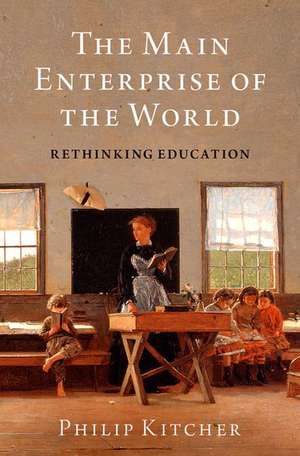The Main Enterprise of the World: Rethinking Education: Walter Strauss Lecture Humanities
Autor Philip Kitcheren Limba Engleză Hardback – 14 feb 2022
Preț: 261.69 lei
Preț vechi: 287.88 lei
-9% Nou
Puncte Express: 393
Preț estimativ în valută:
50.08€ • 52.52$ • 41.76£
50.08€ • 52.52$ • 41.76£
Carte disponibilă
Livrare economică 07-13 decembrie
Livrare express 03-07 decembrie pentru 69.33 lei
Preluare comenzi: 021 569.72.76
Specificații
ISBN-13: 9780190928971
ISBN-10: 0190928972
Pagini: 440
Dimensiuni: 238 x 166 x 37 mm
Greutate: 0.73 kg
Editura: Oxford University Press
Colecția OUP USA
Seria Walter Strauss Lecture Humanities
Locul publicării:New York, United States
ISBN-10: 0190928972
Pagini: 440
Dimensiuni: 238 x 166 x 37 mm
Greutate: 0.73 kg
Editura: Oxford University Press
Colecția OUP USA
Seria Walter Strauss Lecture Humanities
Locul publicării:New York, United States
Recenzii
A towering achievement, worthy of a place beside the classic works of John Dewey, J. S. Mill, and Rabindranath Tagore. Kitcher's radical and compelling idea is that contemporary societies have been designing education to suit jobs that currently exist, when instead we should be imagining an education system that serves the needs of personal fulfillment and interactive democratic citizenship, and designing other social institutions to support those goals. This is ideal theory in the very best sense: a clear-eyed road map of a difficult destination, together with practical proposals for reaching it, articulated with both clarity and an inclusive love of human beings.
Philosophy of education, so vital and so neglected, receives a shot in the arm from Philip Kitcher's foundational, radical, and absolutely essential The Main Enterprise of the World. It also invigorates political theory, ethics, and wide range of other questions, as education—the building of a person—takes its place at the centre of human life.
A remarkable achievement that will attract the attention of philosophers of all stripes, including but not limited to philosophers of education, as well as economists, psychologists, and other social scientists and policy experts. Arguing for a radical reconceptualization of both educational practice and its philosophical, economic, and social underpinnings, Kitcher's Deweyan vision insists that educational activities must aim at the improvement of both individual and collective lives, and reconceives educational ideals as tools of diagnosis and improvement rather than utopian goals to be imperfectly approximated. Kitcher defends that vision artfully and brilliantly. His call for serious educational experimentation, and the several proposed experiments, are important and potentially game changing. The Main Enterprise of the World is a masterful book.
Philosophy of education, so vital and so neglected, receives a shot in the arm from Philip Kitcher's foundational, radical, and absolutely essential The Main Enterprise of the World. It also invigorates political theory, ethics, and wide range of other questions, as education—the building of a person—takes its place at the centre of human life.
A remarkable achievement that will attract the attention of philosophers of all stripes, including but not limited to philosophers of education, as well as economists, psychologists, and other social scientists and policy experts. Arguing for a radical reconceptualization of both educational practice and its philosophical, economic, and social underpinnings, Kitcher's Deweyan vision insists that educational activities must aim at the improvement of both individual and collective lives, and reconceives educational ideals as tools of diagnosis and improvement rather than utopian goals to be imperfectly approximated. Kitcher defends that vision artfully and brilliantly. His call for serious educational experimentation, and the several proposed experiments, are important and potentially game changing. The Main Enterprise of the World is a masterful book.
Notă biografică
Philip Kitcher was born in 1947 in London (U.K.). He received his B.A. from Cambridge University and his Ph.D. from Princeton. He has taught at several American Universities, and is currently John Dewey Professor of Philosophy, Emeritus, at Columbia. He is the author of books on topics ranging from the philosophy of mathematics, the philosophy of biology, the growth of science, the role of science in society, naturalistic ethics, pragmatism, Wagner's Ring, Joyce's Finnegans Wake, and Mann's Death in Venice. In 2019, he was awarded the Rescher Medal for contributions to systematic philosophy.
